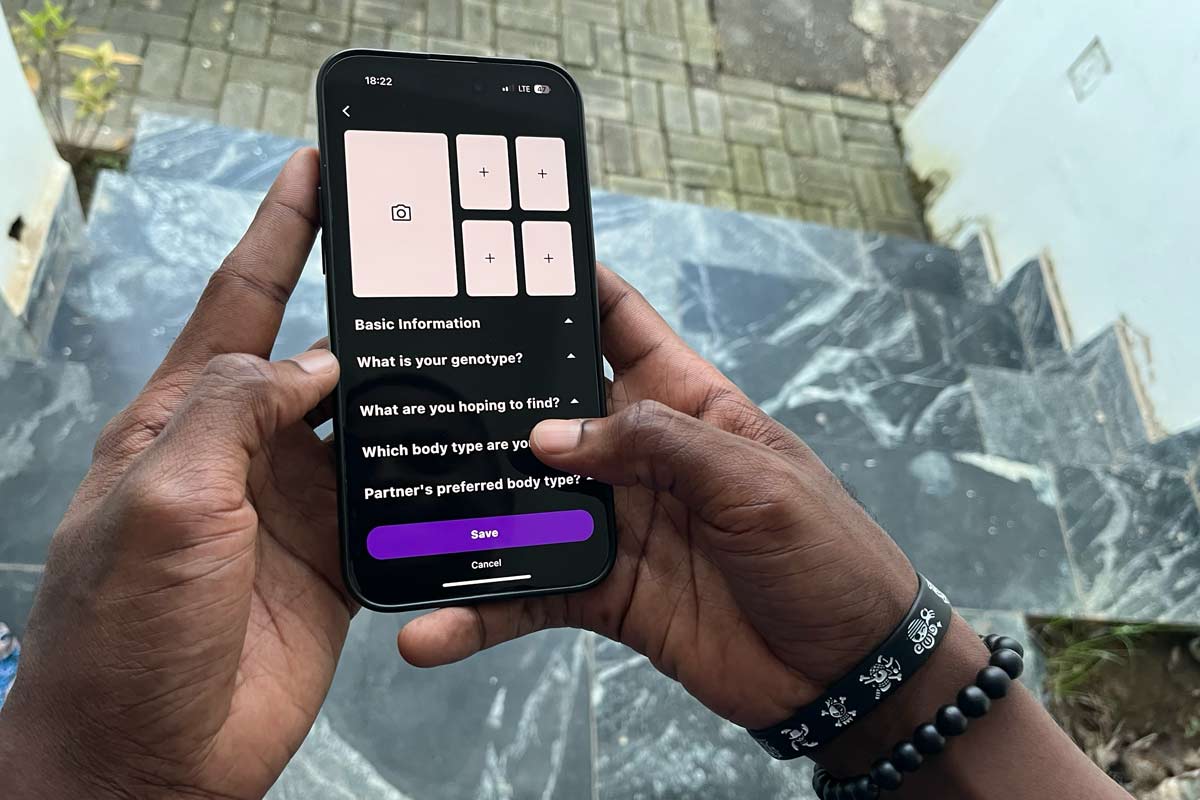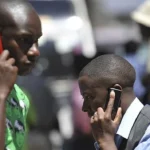Matchmaking apps and dating platforms in Nigeria are joining the fight against sickle cell anaemia, a dangerous and genetically heritable condition.
When Onyinye Igbokwe, the founder of Genzee Baddies – an innovative dating app – turned 25, he discovered that his search for a life partner involved more than just chemistry. It required navigating the complex web of haemoglobin genetic compatibility.
“I kept meeting wonderful ladies and most of them turned out to be AS genotypes and I am AS too,” Igbokwe explained. That “AS” means that Igbokwe is a carrier of the sickle cell trait. Conceiving children with another carrier would put those kids at risk of sickle cell disease. “At the time, I didn’t see it as a big problem, but three years passed, and I kept getting the same.”
Gene-crossed lovers
This prompted Igbokwe to conduct a survey. From it, he discovered that more than 300 participants of the 500 enrolled had likewise found themselves in near-marriage situations, only to realise that their haemoglobin gene was incompatible.
That means that the gene coding for both partners’ haemoglobin – vital oxygen-carrying proteins in the body’s red blood cells – were faulty in the same inheritable way.
Haemoglobin genotypes are categorised and coded as either AA, AS, AC or SS. ‘A’ stands for the healthy gene, and as each person inherits one copy of the gene from each of their parents, the AA genotype indicates that a person has two healthy copies of the gene, meaning normal haemoglobin.
AS and AC, meanwhile, signify sickle cell trait, which describes people who have one normal, and one sickle cell-coded gene. The SS genotype indicates sickle cell disease (SCD): abnormal haemoglobin that can lead to chronic anaemia, crippling pain episodes, increased risk from infections and, all too often, early death.
Two parents with the AS genotype have a 25% chance of conceiving an SS child – a child with SCD. If one parent has the SS genotype, and the other has an AS genotype, the couple has a 50% chance of passing on SCD to each child. Currently, Nigeria has one of the highest rates of SCD in the world. It is estimated that about 150,000 children are born with SCD each year, representing a prevalence rate of 20 to 30 children per 1,000 live births.
As popular understanding of genetic compatibility grows, it has become an increasingly significant aspect of relationships. Fear of genetic disorders, particularly SCD, has led to a greater awareness of the importance of genotype compatibility in the formation of romantic relationships.
The awareness of the disease and its impact on Nigerian families has prompted a rise in the significance of disclosing genotype information in dating and matchmaking platforms.
Alongside traditional details such as age and gender, dating app users now more often consider genotype compatibility as a starter question in their quest for love.
Genetic matches through algorithms
Igbokwe journey, marked by personal experience and surprising survey results, led to the creation of an innovative matchmaking app, Genzee Baddies. The app utilises a genotype match algorithm, streamlining the process of finding a compatible partner and easing the often-difficult conversation surrounding genetic compatibility.
It enables users to input their genotype information when signing up, and automatically be matched with compatible individual. “It also allows users to filter the particular genotype, height, age, body weight of the person you want,” Igbokwe explained.
While Igbokwe initially targeted the young and tech-savvy Generation Z, or ‘Gen Z’, demographic, he quickly realised that the issue of genetic compatibility resonated with a broader audience. After the launch of his app, he discovered that users spanned a wide age range, from those in their 20s to 50s.
Like with many dating apps, there is always the fear of users misrepresenting themselves or providing inaccurate information. This concern is especially relevant in the case of Genzee Baddies, where genetic compatibility is a critical factor in finding a suitable match, “so we are launching a version 2.0 of the app where we will sign an agreement with one of the biggest HMOs [health maintenance organisations] in Nigeria and it is required [for us] to attain your lab result from the HMO, verify it and upload it. So, any time anyone is interested in your profile they can see your verified biodata.”
SCD awareness remains low
Igbokwe’s efforts to combat Nigeria’s sickle cell burden are complemented by other matchmaking platforms, particularly in the northern region of Nigeria, where lack of awareness worsens the issue, leaving communities disproportionately affected by sickle cell.
The lack of awareness is attributed to various factors, including cultural and social stigma, limited education and health literacy, inadequate health care infrastructure, and economic constraints. Additionally, insufficient media coverage, inadequate health education in schools, and limited community engagement contribute to the information gap.
Faced with this, a group of young people from the region banded together to create Arewa Up Matchmaking Platform, a service committed to raising awareness about genetic compatibility and promoting healthy relationships. The platform, which originated from an open forum that promotes discussions about pressing issues facing the region, provides a space where users can connect, converse, and explore the implications of genetic compatibility in their potential partnerships.
But despite the efforts of platforms like Arewa Up Matchmaking to promote awareness and acceptance, the stigma surrounding SCD continues to affect individuals, especially women, on these platforms. A regulator of the platform, speaking anonymously, shared that women living with SCD often face greater difficulty finding compatible matches, even on an app that seeks to foster open-mindedness. “From the onset, when a man sees a lady with the SS genotype], the first thing that comes to his mind is the painful crisis, the responsibility. Maybe it is a gender thing but women matching with men living with SCD are more common due to their willingness to compromise,” the regulator explained.
Laws to promote genotype compatibility suffer slow adoption
In response to the high prevalence of SCD in Nigeria, the National Assembly is currently considering a national law that aims to address the issue.
Since 2017, four states in Nigeria have taken matters into their own hands, implementing legislation that requires premarital genotype testing for couples. This proactive approach seeks to reduce the incidence of SCD by providing couples with critical information about their genetic compatibility before they enter into marriage.
However, several challenges hinder the effective implementation of premarital genotype screening programmes. According to a recent study conducted by Nguvu Collective, a civil society organisation, these include myths and misconceptions that discourage participation, inaccessibility and high costs of genotype screening services.
There is also insufficient health system infrastructure and funding to provide comprehensive care for SCD, especially in rural areas. Finally, socio-cultural and religious beliefs that emphasise marriage and family lineages over genetic compatibility contribute to resistance to genotype screening.
To tackle these, Nguvu Collective recommends launching targeted public awareness campaigns to educate people about SCD; developing the capacity of health care providers, researchers and community leaders through training and workshops to enhance SCD management and care delivery; investing in research initiatives to improve understanding of SCD; develop new treatments; and optimise existing medication.
It also suggests encouraging individuals living with SCD to share their experiences, fostering empathy and understanding of the disease.
This article was originally published on VaccinesWork
Matchmaking apps and dating platforms in Nigeria are actively addressing sickle cell anaemia, a prevalent genetic disorder in the region, by emphasizing genotype compatibility. Onyinye Igbokwe, founder of the dating app Genzee Baddies, realized the significance of haemoglobin genetic compatibility after personal experiences revealed many potential partners had the AS genotype, similar to his own. Such pairings could lead to children with sickle cell disease (SCD), prompting Igbokwe to develop an app that employs a genotype match algorithm to better assist users in finding compatible partners.
Awareness regarding SCD's impact is increasing, leading to genotype information being a key factor in dating preferences. This has led to the creation of platforms like Genzee Baddies and Arewa Up Matchmaking Platform, which promote genetic compatibility and awareness. However, challenges such as misinformation, inadequate healthcare infrastructure, and cultural resistance remain prevalent, especially in the northern regions of Nigeria.
Efforts are being made to implement laws for mandatory premarital genotype testing in Nigeria, though challenges related to infrastructure, costs, and cultural beliefs hinder progress. Organizations like Nguvu Collective are advocating for public awareness campaigns, better health infrastructure, and research to enhance the management and understanding of SCD. These initiatives aim to reduce the disease's prevalence and support individuals with SCD, fostering a more informed approach to relationship-building in Nigeria.






